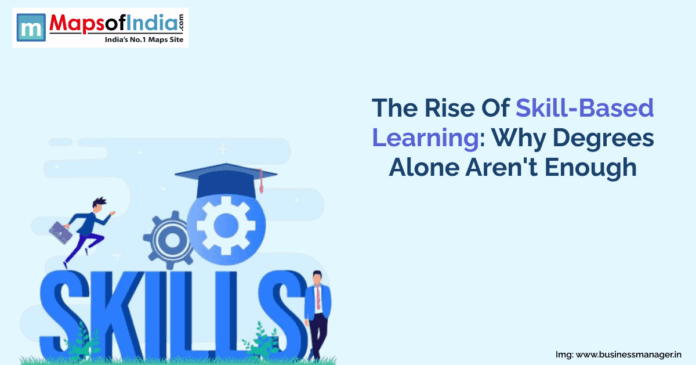In Indian society, where having a degree is still considered the greatest achievement, which has been considered the golden ticket to success, but today, a change is happening. The rise of skill-based learning has been gaining societal approval. Changing people’s point of view about academic credentials. With changing and advancing technology and new skilled employment demand, where skills like data analysis, digital marketing, and coding are considered important to have a proper career.
The Changing Job Market
Why Degrees Are Losing Their Importance
Historically, degrees from prestigious institutions like IITs and IIMs guaranteed lucrative careers in India. However, in recent times, this is not true anymore. Only 46% of Indian graduates are employable according to the 2024 report, down from 54% in 2019. Recruiters are saying that new graduates lack skills like problem-solving, digital literacy, and adaptability. The rise of automation and AI has also shifted the priorities of recruiters. According to a report, 60% of jobs in India will require digital skills by 2026.
Global and Indian Trends
Globally, the shift toward skills is acceptable. In a recent recruitment trend, it has been found that 69% of employers prioritise skills over degrees. This trend is mirrored in India. The Indian IT sector, which employs 5.4 million graduates, now give more importance to certifications in cloud computing and AI over traditional degrees. Emerging sectors like healthcare and retail are also asking for specialised skills, from telemedicine to e-commerce logistics.
What is Skill-Based Learning?
Defining the Approach
Skill-based learning mostly focuses on practical learning. Giving job-necessary information over theoretical knowledge. Unlike degree programs, which focus on hands-on training. Skill-based programmes are short courses provided online or offline platforms, bootcamps.
Platforms Driving the Shift
Online platforms like Coursera, upGrad, and Udemy have made skill-based learning available to everyone. On Coursera, 2.8 million Indian learners are enrolled in courses that are skill-oriented. Government initiatives like Skill India and the National Skill Development Corporation (NSDC) have trained 13 million youth since 2015, which focus on sectors like IT and hospitality.
Why Skill-Based Learning is Gaining Traction
India’s economy is projected to reach $5 trillion by 2027, which demands a skilled workforce.
Startup: India is becoming a new startup hub of the world. Having more than 100,000+ startups in a year. Most of these startups are using new technological innovations.
Gig Economy: India has also seen a boom in the gig economy. With 15 million gig workers who have skills like content creation and app development are critical.
Global Competitiveness: On the global stage, skills are considered more important than a degree. And to keep up with these changing global phenomena, India also needs to change.
Employer Preferences
A recent survey in 2024 has shown that 65% of Indian recruiters prioritise candidates with certifications or projects in their portfolios over a college degree. IT giants like TCS and Infosys are now adding skill assessments into hiring, where 80% of job postings list specific technical competencies.
Youth Aspirations
India’s Gen Z population, which is over 377 million, give more importance to flexibility. 55% of Indian youth aged 18–24 prefer short-term skill courses over four-year degrees.
Benefits of Skill-Based Learning
For Individuals
Faster Career Entry: Six-month courses give more career opportunities and a guarantee of a job than a four-year degree.
Affordability: Doing an Online course can cost from ₹5,000 to ₹ 50,000, while on the other hand, a degree can cost from ₹5 to 20 lakh for degrees.
Flexibility: Skill-oriented online courses give flexibility in learning. People can learn at their own pace.
For Employers
Job-Ready Talent: According to a study, Candidates with practical skills reduce training costs by 25%.
Innovation: Skilled workers in a specific sector can drive digital transformation, which is necessary for India’s IT and startup sectors.
For Society
Economic Growth: A skilled workforce can boost GDP while contributing to more aspects of economic growth, like moonlighting and the gig economy.
Inclusivity: Skill programs empower women and rural youth. Here, people can work online, getting jobs based on individual skills only.
Challenges to Overcome
The accessibility of the internet is a major problem, as only 43% of Indians have proper internet access, limiting access to online learning platforms and job opportunities. Rural areas face these infrastructure gaps.
Need quality control of online course platforms. With the boom of skill-oriented courses on all online platforms, distinguishing between good courses is a problem. This course also charges a lower fee, which leads to it gaining more popularity and resulting in low results.
Need to raise awareness among rural youth. 50% of rural youth are unaware of skill-based programs. Urban-rural disparities in awareness persist.
Traditionalism presents a mindset that sometimes resists change. They value degrees over skills. We can see these especially in Tier-2 and Tier-3 cities, where 60% of parents prefer conventional education.
Opportunities for Growth
Government Initiatives like Skill India’s PMKVY 4.0 aim to train 7 million youth by 2027. which focuses on AI, robotics, and green energy. To fulfil this government had partnered with tech giants like Microsoft to enhance course credibility.
Supporting Edtech Innovation, AI-driven platforms like upGrad and Simplilearn offer personalised learning paths, with 80% completion rates compared to 50% for traditional courses.
Collaboration with industry giants. Companies like Amazon and Google provide free skill courses. This helps youth who can’t afford paid courses. Such partnerships bridge the skill gap.
The Future of Skill-Based Learning in India
Policy Support from the government. The National Education Policy (NEP) 2020 integrates skill-based learning into new education policies, with 50% of schools adopting vocational training by 2025. This aligns with India’s vision of a “Viksit Bharat” by 2047.
India aims to become a global skill hub, exporting talent in AI and cybersecurity. A 2024 NASSCOM report projects 1 million Indian professionals in global tech roles by 2030.
Technology Integration in Skill-Enhancing Programmes. AI and VR will enhance skill training, with 30% of edtech platforms adopting immersive learning by 2026.
Conclusion
The rise of skill-based learning in India marks a bigger shift in the Indian education system, where degrees are no longer considered the sole pathway to success. Changing economic demands, technological advancements, and new youth aspirations, skills like coding, analytics, and digital marketing are reshaping careers. The changing career course shows that now employers need to adapt to this change. Youth need to use the available platforms, use government support and enhance their skill set to become ready for today’s changed world. Degrees may open doors, but skills ensure you thrive beyond them.





